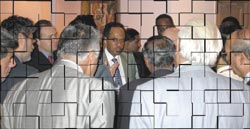The Delhi Declaration
 Every climate change conference ends with an outcome, usually a text that lays down the roadmap for the future. For the eighth Conference of Parties (CoP-8), this was to be the Delhi Declaration.
Every climate change conference ends with an outcome, usually a text that lays down the roadmap for the future. For the eighth Conference of Parties (CoP-8), this was to be the Delhi Declaration.
CoP-8 president T R Baalu released the first draft on October 28, 2002. It was a miserable document. It pretended that the Kyoto Protocol didn't exist. Issues such as 'mitigation' and (protocol) 'ratification' weren't mentioned. The draft meekly called on industrialised countries to implement their commitments under the convention. Some felt it was a copy-paste job, relying on bits of earlier declarations. Delegates began to question Baalu's leadership. The EU and countries such as Australia, for different reasons, got ready to do some serious fighting.
Baalu released the much-awaited second draft late in the evening on October 31, 2002. The ministerial segment of the conference was already under way. The major groups, including the G-77 and the EU quickly huddled into meetings to discuss the new draft. Beat Nobs, a Swiss delegate, pointed out that the draft had no clear reference to the Third Assessment Report (TAR) to the Intergovernmental Panel on Climate Change (IPCC), which talked about dangerous climate change, and a call for mitigation of climate change by all countries. But a South African delegate, speaking on the condition of anonymity as the declaration was still being debated within the G-77, said many countries within the group wanted the reference to TAR deleted. Besides, no developing country was willing to consider language that could be interpreted as the need to take on future commitments.
The CoP-8 President convened negotiations later that night. When negotiators took a short break around 2:15 am on November 1, 2002, it was clear that they had made little progress. Some delegates seemed particularly annoyed with Saudi Arabia. A Portuguese delegate said, "They are very smart, they know when it is the right time to obstruct."
When negotiations finally closed at 6 am in the morning, only some of the paragraphs in the preamble, the language on Kyoto and some non-controversial issues had been cleared. At 11:30 am, while the major groups were locked in informal negotiations with the President, a Danish delegate said that the issues unresolved were TAR, renewables and future commitments. He added, "OPEC countries, whose interests are very different from the rest of the world, are having a significant influence on the position of G-77/China."
Hopes of a declaration began to fade. "There is still a deadlock and negotiations are still on. Commitments is the sticky issue", said Luis Herrera, the head of the Venezuelan delegation, at around 3:00 pm. Speaking about commitments, a Swiss delegate said, "If we let it go this time they will use it against us. They will say it is not in the declaration."
Finally at around 6 pm, about 24 hours after the second draft was released, the final negotiated text was presented to the plenary for approval. "Obviously, the declaration is a consensus paper. It cannot satisfy everybody. I am not satisfied. Nobody is fully satisfied", said Mutsuyoshi Nishimura of Japan in his speech at the closing plenary. The eu was very disappointed too. Steen Gade, head of the EU delegation, felt the text significantly "lacked action and a vision for the future." Canada too was critical: "The stakes are high and the cost of inaction are great", said the head of the Canadian delegation David Anderson, in his closing speech.
But there were those who were happy. "The Delhi declaration has both great substantive and symbolic importance for developing countries. It recognises the need and aspirations of the developing world", said Mohammed Sanusi Barkindo of Nigeria in the closing plenary. The Chinese, too, were satisfied. "The theme of the Delhi declaration is to place the solution to climate change within the context of sustainable development and this is an effective way to address climate change," the Chinese delegate said.
Two mysteries remained unsolved. The first was absolute US approval for the declaration. Rumour had it that the US found a weak declaration more convenient than a strong one, given its rejection of the protocol and the Kyoto process. The second was a special mention, in the declaration text, thanking CoP-8 president Baalu for his efforts. Such a mention had no precedent. For one who provided no vision to CoP-8's outcome, and whose leadership was under grave doubt a couple of days ago, such unprecedented approval raised curious eyebrows. What was he actually being thanked for?
Related Content
- Joint Committee report on steps taken to arrest fire at dumpyards, Delhi, 21/09/2022
- Order of the National Green Tribunal regarding rejuvenation of river Yamuna, 27/01/2021
- Order of the National Green Tribunal regarding declaring a water body in NCT Delhi as wetland, 10/10/2019
- Order of the National Green Tribunal regarding contamination of ground water in Delhi, 11/09/2019
- As Kerala declares Ernakulam Nipah-free, youth recalls struggle
- Where India stands in battle against measles, how Sri Lanka eliminated it
